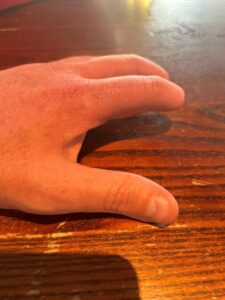North Wales health board fined after failings resulted in woman’s death
One of the largest health boards in Wales has been fined £200,000 after a patient died in its care.
Llandudno Magistrates’ Court heard that 46-year-old Dawn Owen was found unconscious at the Hergest Unit – a secure mental health unit – at Ysbyty Gwynedd in Bangor on 20 April 2021.
Dawn’s family have called on Betsi Cadwaladr University Health Board to act on the findings of a Health and Safety Executive (HSE) investigation, calling her death ‘wholly avoidable’ and ‘completely unnecessary’.
“Staff complacency at all levels contributed in this case, as well as numerous policy breaches and issues between staff and management,” they said.
“We have been tragically let down by the Hergest Unit, who we believed, were providing a safe place for Dawn and the care that she urgently needed.”

The HSE investigation found no risk assessment had been carried out when she was admitted and due to communication failure on transfer to the ward, staff had wrongly relied on an assessment carried out for a previous admission a year earlier. This failure resulted in Dawn’s high risk of self-harm being tragically missed.
Staff also failed to place her in an anti-ligature bed and had de-escalated the completion of regular monitoring checks. Dawn was also provided with a dressing gown and belt, of which the belt was later used as a ligature.
There were several missed opportunities during the course of the admission, where Dawn had expressed the desire to self-harm. This did not trigger any review of the care and management of the patient.
“Dawn was a highly vulnerable person and had been battling her demons and addictions for many years,” the family went on to say.
“She was a bright, happy person who always had a positive attitude. She had a heart of gold and would always help others in need – she would give away her last penny to do so.
“Betsi Cadwaladr must now act on the findings of this investigation and keep vulnerable patients safe at the unit.
“We hope as a family that Dawn may now rest in peace – her battles with mental health are now over.
“We as a family would like to thank the Coroner and HSE for their diligence in ensuring there was a thorough investigation into Dawn’s untimely death.”
Betsi Cadwaladr University Health Board have pleaded guilty to breaching Section 3 (1) of the Health and Safety at work Act 1974 and have been fined £200,000 and ordered to pay costs of £13,174 at Llandudno Magistrates’ Court on 18 December 2023.
Speaking after the case, HSE inspector Sarah Baldwin-Jones said: “This incident could so easily have been avoided had a thorough risk assessment been carried out on admission, identifying in this case, the change in Dawn’s condition and risk of self-harm.
“Where a patient presents with a risk of self-harm, there is a requirement upon a health board to manage the patient’s safety, to avoid incidents like this. Devices such as reduced ligature beds and removing ligature anchor points and ligatures in the ward environment, can assist staff manage these risks. Importantly, the health board should have trained staff in managing this risk in patients considering self-harm.
“This would enable staff to identify the trigger points and take appropriate actions. The health board also failed to monitor the management of patients, so that any patient emotional or behavioural changes can be identified and managed.
“Health Boards and Trusts should be aware that HSE will not hesitate to take appropriate enforcement action against those that fall below the required standards. Our thoughts remain with Dawn’s family and friends.”
This prosecution was led by HSE enforcement lawyer Samantha Wells.
Notes to editors:
- The Health and Safety Executive (HSE) is Britain’s national regulator for workplace health and safety. We prevent work-related death, injury and ill health through regulatory actions that range from influencing behaviours across whole industry sectors through to targeted interventions on individual businesses. These activities are supported by globally recognised scientific expertise.
- More information about the legislation referred to in this case is available.
- Further details on the latest HSE news releases is available.

